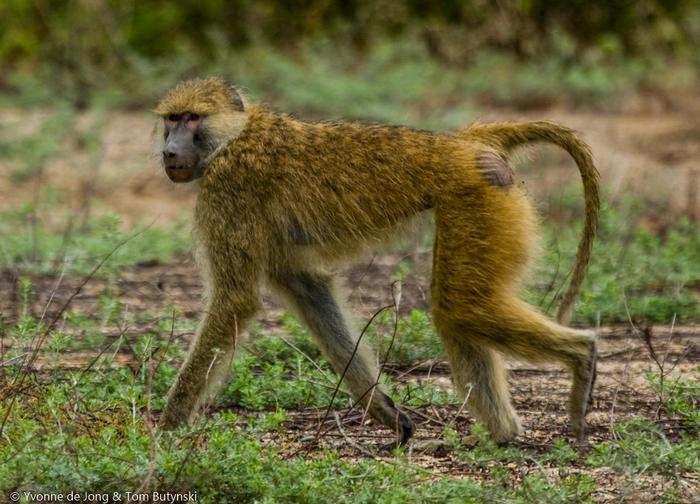Researchers from 24 countries have analyzed the genomes of 809 individuals from 233 primate species, generating the most complete catalog of genomic information about our closest relatives to date. The project, which consists of a series of studies in which researchers from the German Primate Center – Leibniz Institute for Primate Research (DPZ) were also involved, provides new insights into the evolution of primates, including humans, and their diversity. In baboons, for example, hybridization and gene flow between different species occurred in the past and is still ongoing in several regions of their range. This makes baboons a good model for the evolution of early human lineages within and outside Africa. In addition, using a specially designed AI algorithm, the genomic data enable new insights into the genetic causes of human diseases (Science, Special Issue).

Credit: Yvonne A. de Jong & Thomas M. Butynski
Researchers from 24 countries have analyzed the genomes of 809 individuals from 233 primate species, generating the most complete catalog of genomic information about our closest relatives to date. The project, which consists of a series of studies in which researchers from the German Primate Center – Leibniz Institute for Primate Research (DPZ) were also involved, provides new insights into the evolution of primates, including humans, and their diversity. In baboons, for example, hybridization and gene flow between different species occurred in the past and is still ongoing in several regions of their range. This makes baboons a good model for the evolution of early human lineages within and outside Africa. In addition, using a specially designed AI algorithm, the genomic data enable new insights into the genetic causes of human diseases (Science, Special Issue).
Primates show great genetic diversity that varies between species and geographic regions. “Studying this diversity is crucial also for understanding human evolution, the causes of human diseases, and for preserving our closest relatives,” says Christian Roos, a scientist in the Primate Genetics Laboratory at the German Primate Center and one of the authors. Led by researchers from Universitat Pompeu Fabra, Spain, Baylor College of Medicine, USA, and Illumina Inc, USA, the genomes of 809 individuals from 233 primate species have been sequenced. This covers nearly half of the extant primate species and increases the number of available primate genomes fourfold.
New insights into primate evolution and the uniqueness of humans
The comparative analyses provide fundamental information on the genetic diversity and evolutionary history of primates and important insights into what distinguishes humans from other primates. The genomic data have halved the number of genomic variants thought to occur exclusively in humans. “This makes it easier to look for mutations that we do not share with other primates and that could therefore be the basis for the traits that make us human,” says Dietmar Zinner, a scientist in the Cognitive Ethology Laboratory at the German Primate Center and also one of the authors.
One of the studies looks more closely at baboon evolution and finds that there have been several, previously unknown episodes of hybridization and gene flow between baboon species. “We found that baboons from western Tanzania are the first nonhuman primates to have received input from three genetic lineages,” said Liye Zhang, a doctoral student at the German Primate Center and one of the lead authors of the baboon study. “These results suggest that the genetic structure of the baboon population and its history of genetic exchange between species is more complex than previously thought and show that baboons make a good model for similar processes in the evolution of early human lineages in and outside Africa,” says Dietmar Zinner.
Species conservation with the help of genome data
High genetic diversity enables species to better adapt to changing environmental conditions and pathogens. Especially in small populations, there is a risk of inbreeding and thus a reduction in genetic diversity. Already, 63 percent of all primate species are threatened with extinction, and the analysis of genetic diversity provides information which species most urgently need to be protected, at least from a genetic point of view. “We found particularly low genetic diversity in the golden snub-nosed monkey of China and the aye-aye in Madagascar,” says Christian Roos.
Rare mutations can increase disease risk
One of the limitations in human and clinical genetics is that it is currently not possible to identify among hundreds of thousands of mutations those that cause disease. To date, the genetic causes of many common diseases, such as diabetes and heart disease, are unknown, due either to a lack of genetic information or to the large number of genetic and other factors involved. By comparing the primate genomes, 4.3 million mutations have now been identified that may alter protein function and thus lead to disease in humans. Six percent of the 4.3 million mutations identified are, however, common in primates and are therefore considered to potentially have little impact on human disease because they are tolerated in these animals. Thanks to the PrimateAI-3D deep-learning algorithm developed by Illumina Inc, disease-causing mutations can now be better identified. “It’s a kind of ChatGPT for genetics that uses genome sequences instead of human language,” explains Kyle Farh, vice director of the AI group at Illumina Inc, the global leader in DNA sequencing.
Journal
Science
DOI
10.1126/science.abn7829
Subject of Research
Animals
Article Title
A global catalog of whole-genome diversity from 233 primate species.
Article Publication Date
1-Jun-2023




